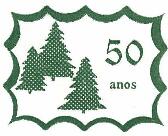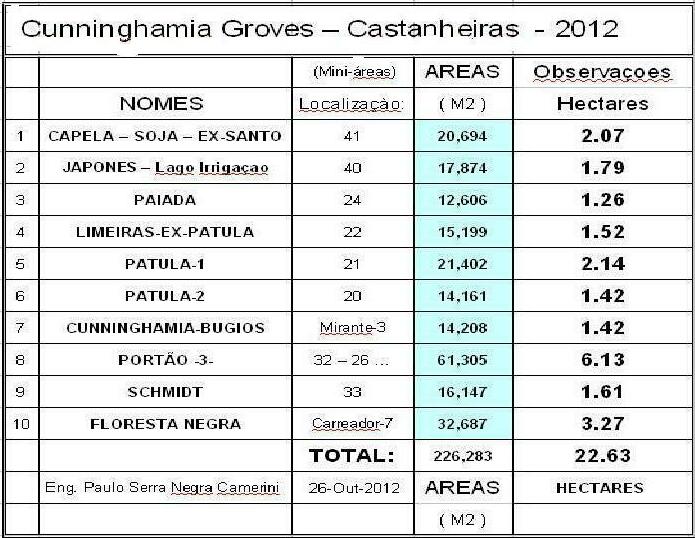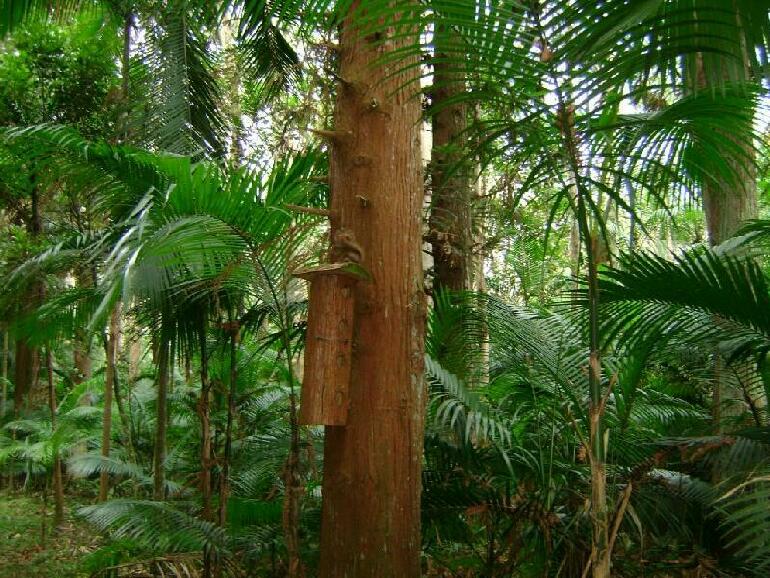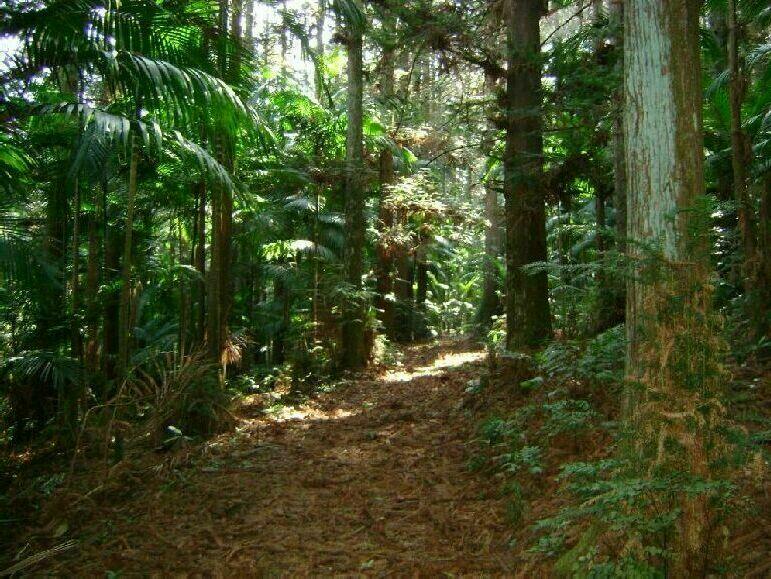
| Indice-Palmito | Palm tree heart | Home | Irrigation |
Sustainable management feasible in São Paulo
The culture of the Jussara palm tree
.
 |
. Agro
Castanheiras Ltda.,
founded in 1962, |
|
The reforestation of
the 138 hectares (345 acres), in a rural
area of the São Paulo-city (Parelheiros
District), was initiated in 1942 by the
company's founders. The entire area was then
planted with eucalyptus as well as Cunninghamia simensis
trees and other species to produce selected Christmas
trees. Three preexisting Atlantic Forest groves were
preserved there.
The same year a request
was made at DPRN, for the institution of the Legal
Reserves in the farm, according to the State of São Paulo´s
current legislation, subsequently filed at the local
Registry of deeds. |
| Indice-Palmito | Palm tree heart | Home | Irrigation |
|
CULTURE of the Palmito Jussara - Euterpe edulis
In
1985 the very first attempt to plant the Jussara
palm tree was carried out inside a section of an
Atlantic Forest grove. Since it was
located in the very central part of the farm no "palmiteiro"
had entered there since 1942.
This
grove is locally designated "O Palmital" (the
palm grove) due to the predominance of this species
there, which stands out due to the high density of
the specimens that prevail in the undergrowth of the
forest. Access to this area is called the "Palmital"
trail. It starts at the
watershed (Crossroad : 'Ex-Patula', 'Patula-1' and
'Patula -2', local designations for three
Cunninghamia groves separated by inner lanes). This
experience in the native forest was not successful
at all. No seedling survived due to excessive
shade. In no way would the farm consider any kind of
thinning or pruning inside a Native Forest.
The
following
year – 1986 – a second experiment was made on a
small scale: the sowing and subsequent bedding of
seedlings within a Cunninghamia grove.
Previous thinning and pruning were carried out there
in order to allow for adequate conditions of light.
This time the result was excellent!
During
longer periods of drought, the newly planted
seedlings are irrigated in order to ensure their
proper development. It is performed by spraying,
either using tractors, or manually by the planter.
Specially reserved rows provide access
to the Cunninghamias.
See : (movie "irrigating") => http://agroreserve.com/Palmtrees-2011/Palm-3-Irrig.html Destination of seedlings ready to be planted Two and a half years after sowing, the seedlings can be transplanted to their definitive location. The ground among the eucalyptuses must be previously prepared. A strip one meter wide is mowed between
the rows of old eucalyptuses, respecting the native
species of undergrowth found there. Such a
preparatory mowed surface is locally called "leira".
As
soon as the rainy season starts, the seedlings are
planted at a 1.20 meter spacing.
From
that year on the systematic Jussara Palmito culture
began on Castanheiras farm. Hundreds of thousands palmito
seedlings have been produced there during the last
two decades due to the favorable conditions
there.
All
this can be viewed on the site, where visitors may
observe a culture which could be considered
unprecedented.
Palm
trees spring up there amid the Pinheiro (China
Firs).
There
is also a natural dispersal provided by the
wildlife. Animals feel a safe refuge on top of the
Cunninghamias.
The
company has already invested considerable resources
for the preservation of the area and has created a
model of environmental conservation within the city
of São Paulo.
It is significant to know about the background of this culture in order to understand the cause and effect which led to what are now called "exceptional conditions." From Christmas tree
culture to Palmito production
The
conditions there are unusual due to the previous
culture of Cunninghamia-Christmas trees that had
been developed since 1942 (70 years).
From
time to time a chosen eucalyptus grove underwent a
clear-cut in order to plant Cunnighamias. It is
quite a laborious culture. During the dry months the
irrigation system was used to further growth.
From
the 1970's on, the trees received annual pruning
(machete-shearing) in order to increase the density
of their branches. Thus Christmas trees of
incomparable beauty were produced.
Every
year,
during spring (Sept.- Oct. in Brazil), a screening
was carried out to select the very best trees. Only
10% of the planted trees were tagged to be cut for
Christmas. The remaining ones became the forests
that are presently found there and that provide
habitats for wildlife and also the proper site for
the palm tree culture.
An
interesting fact should be mentioned: the
stumps of the extracted Cunnighamias sprouted.
Thus, a few months after Christmas, approximately
five sprouts appeared. The excessive sprouts were
removed, leaving a single bud to form the new tree.
This operation is called locally “desbrota”.
An
attentive observer will realize that this has
involved serious, conscious and responsible work
that is beneficial to the environment. Hence
the unusual conditions found there presently
facilitate this new culture.
Thus,
the Cunninghamia (exotic species) groves in São
Paulo turned out to be a valuable tool for the
systematic palm tree culture. The company also
produces Cunnighamia seedlings for customers
interested in forming groves of the species.
In 2008 the partners realized that the efforts dedicated to that culture resulted in an excess of palm trees in the area. Their extensive shade was inhibiting the development of other native species, which is harmful for the environment. Therefore they considered advisable to carry out a controlled thinning of the palm trees, something that is presently forbidden by Law. |
| Indice-Palmito | Palm tree heart | Home | Irrigation |
|
Quite understandably
governmental department officers of the Municipality
hesitated to grant such an unique license for the
sustainable management of the Jussara Palmito culture,
which is considered an endangered species.
License for this endeavor will ensure the continuity
of an existing culture, using an entire structure
created during the last seven decades and shall
promote the planting of more palm trees across the
farm, especially among the old eucalyptuses, being
beneficial to the environment inside the
"APA-Bororé-Colonia". It is an
example and encouragement for the private sector of
what can be done for the environment.  |

| Indice-Palmito | Palm tree heart | Home | Irrigation |

| Indice-Palmito | Palm tree heart | Home | Irrigation |